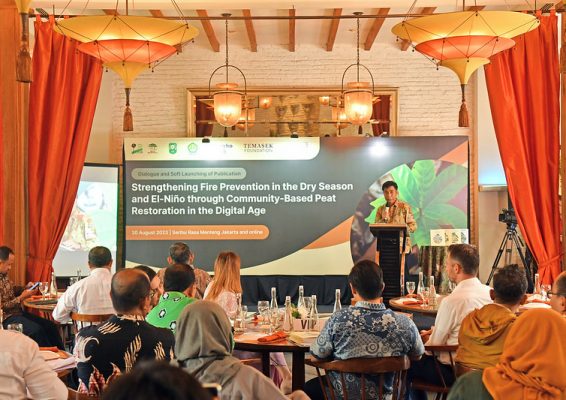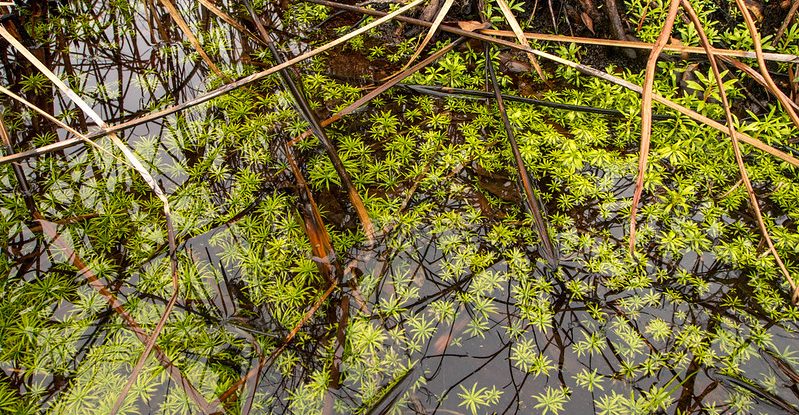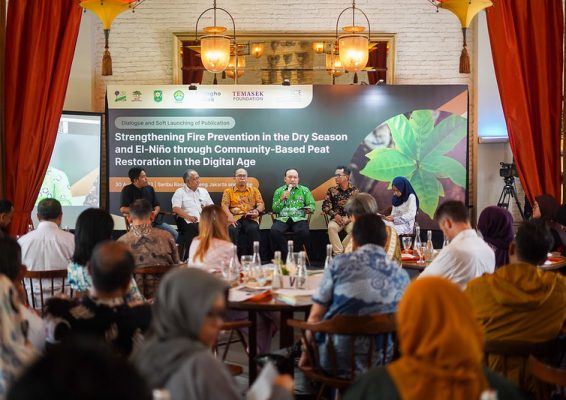In rural Indonesia, clearing forests and peatlands for farming is a common practice among local communities. The practice can have devastating consequences if the fires are not controlled. Peatland fires are particularly difficult to keep in check, as they spread easily – and often invisibly – beneath the top layer of peat.
To prevent forest and peatland fires, the Center for International Forestry Research and World Agroforestry (CIFOR-ICRAF) is collaborating with several local and regional research partners: the Provincial Government of Riau; the Center for Peatland and Disaster Studies at the University of Riau; and Sedagho Siak, a coalition of local, national and international civil society organizations (CSOs). The partners are conducting augmented Participatory Action Research (PAR) on community-based fire prevention and peatland restoration in the villages of Kayu Ara Permai and Penyengat in Sungai Apit Subdistrict, Siak Regency, Riau Province. The location is strategic: over half of Siak Regency’s land area comprises peatlands, and its most recent fires, in 2020 and 2021, accounted for 4–5 percent of all forest and land fires in Riau over that time period.
At an event in Jakarta on 30 August 2023, the partners launched a new book entitled ‘Fire Prevention and Peatland Restoration – Community-based Action in the Digital Age’, sharing their findings from the research. They also presented a toolbox and compilation of lessons learned, which was written collaboratively with local communities and will be shared with CIFOR-ICRAF colleagues in Latin America and Africa.
Herry Purnomo, the lead scientist for the research and CIFOR-ICRAF Senior Scientist and Deputy Country Director for Indonesia, highlighted the importance of using a Participatory Action Research (PAR) approach in the project, which combines research and action. “There is no good restoration if we neglect the role of local communities,” he said. “For this reason, we worked very hard on the ground to synergize in developing business models. We cannot restore the peatlands if we don’t improve the livelihoods of the people.”
The project employed ‘Augmented PAR’ methods that involved phases of reflection, planning, action, and monitoring. “As it is action research, we do not only give recommendations but we give results that can be used for evidence-based policies,” said Purnomo. The process showed the value of PAR for cost-efficient restoration and impact monitoring.
Conducting research in the era of the COVID-19 pandemic brought big challenges, as the scientists couldn’t engage in face-to-face interaction with the targeted community, and had to use a range of Information and Communication Technology (ICT) options to enable remote participation, such as Zoom, Google Meet, and WhatsApp groups. However, as the publications outline, this limitation also had its advantages, and led to important learning about collaboration across distance.
CIFOR-ICRAF research officer Dyah Puspitaloka shared her hopes that the publications would inspire communities in other places to confront challenges and prompt innovation. “We hope this research leads to digital transformation for scientists as well as communities at the grassroots, and can be used to build business models together.” Within the project, she noted, possibilities arose for building businesses in peatland areas, fisheries, plantations, and eco-tourism, but their development requires more research.
Rogier Klaver, CIFOR-ICRAF’s head of project management, confirmed that the involvement of stakeholders from local and national governments, private companies, civil society, academia, and local communities, play a very important role in fire prevention and peatland restoration. Kaharuddin, the head of Indonesia’s Regional Disaster Management Agency agreed: “An integrated system is needed for speed and accuracy in handling forest fires,” he said.
Husni Merza, the vice-regent of Siak, said that within the regency villages already have fire-prevention budgets, and should be encouraged to use these with assistance from other stakeholders. “We also spread knowledge about which plants are suitable for growing on peatland and have economic benefits,” Merza said.

CIFOR-ICRAF senior research officer Beni Okarda said that the research contributed towards enhancing community-based restoration monitoring systems, whereby communities were encouraged to participate in compiling data by monitoring peatland water levels and tree cover – including through setting up groundwater monitoring points, and preparing and installing dip-wells and subsidence poles.
Ecologist Ahmad Muhammad said that, in the model of the ‘Fire Care Communities’ developed in Indonesia since 2015, what’s now needed are Water Care Communities to keep a close eye on water scarcity in peatland areas. “The most important thing is to nurture more bottom-up initiatives,” he said.
This research was supported by the Temasek Foundation and the Singapore Cooperation Enterprise.
We want you to share Forests News content, which is licensed under Creative Commons Attribution-NonCommercial-ShareAlike 4.0 International (CC BY-NC-SA 4.0). This means you are free to redistribute our material for non-commercial purposes. All we ask is that you give Forests News appropriate credit and link to the original Forests News content, indicate if changes were made, and distribute your contributions under the same Creative Commons license. You must notify Forests News if you repost, reprint or reuse our materials by contacting forestsnews@cifor-icraf.org.

